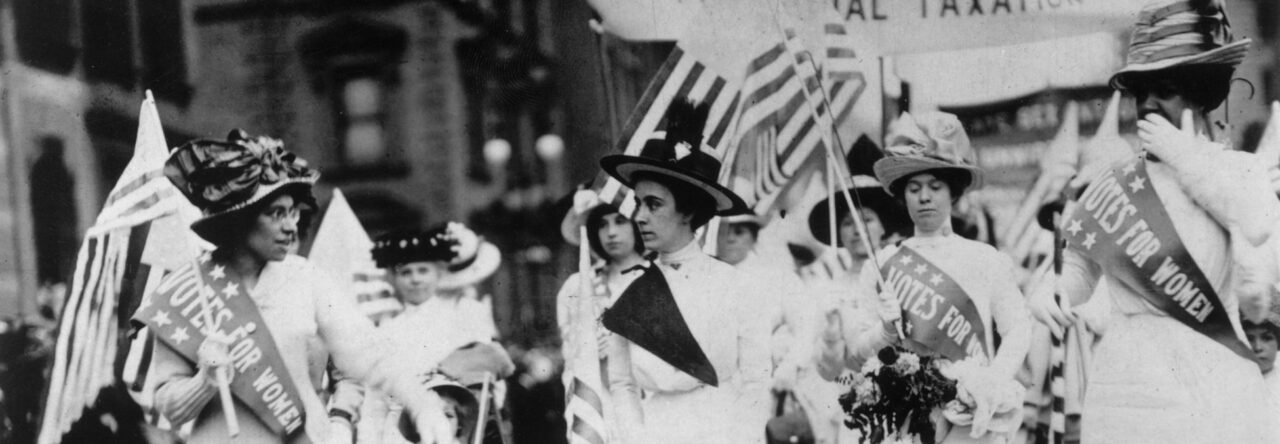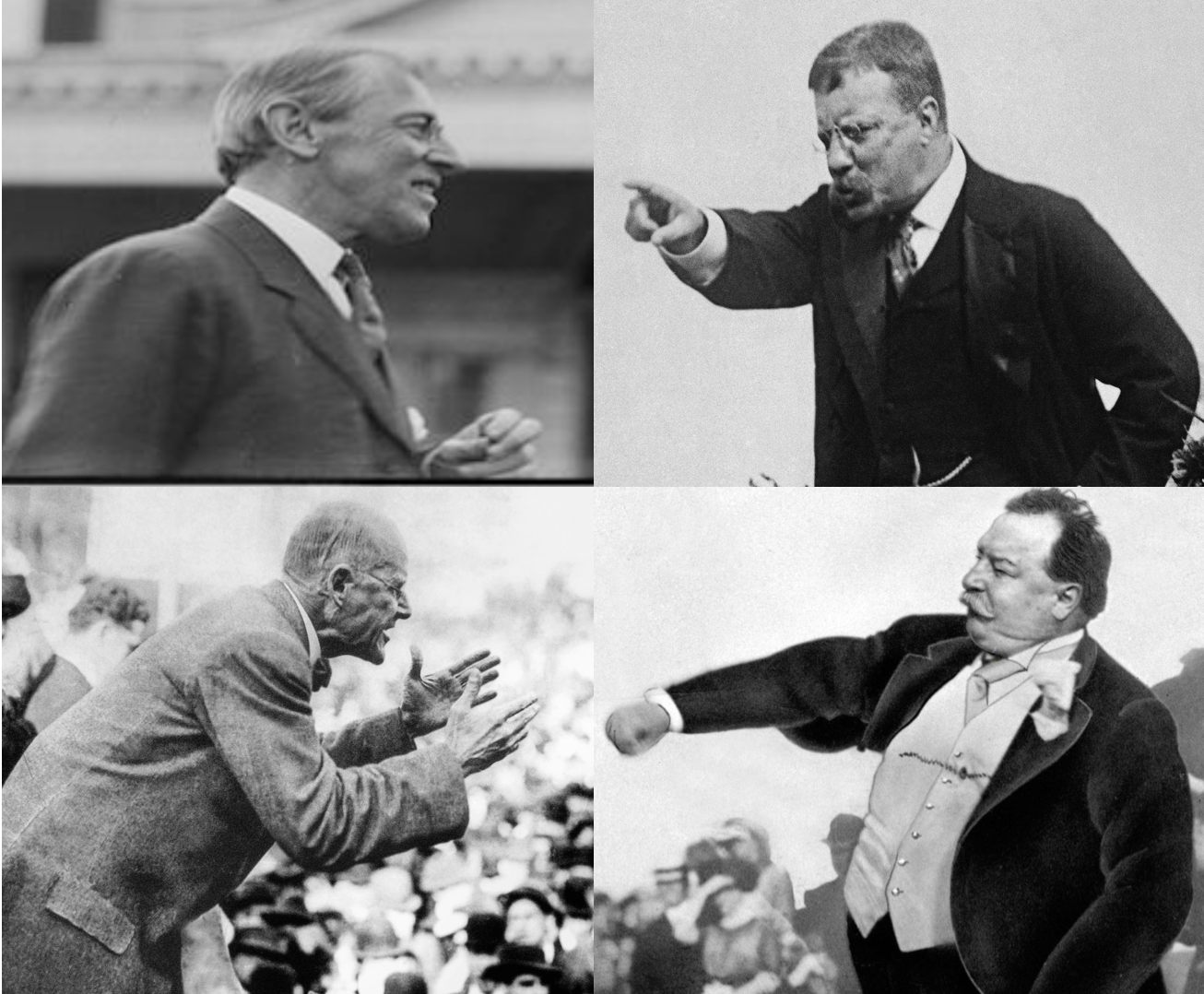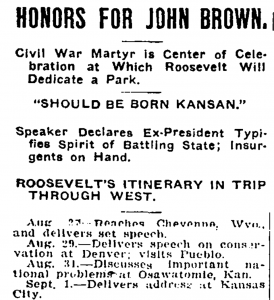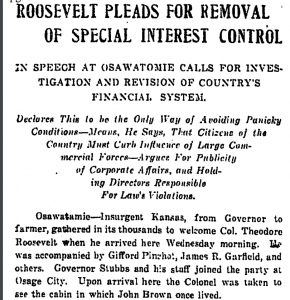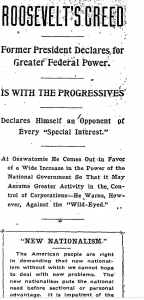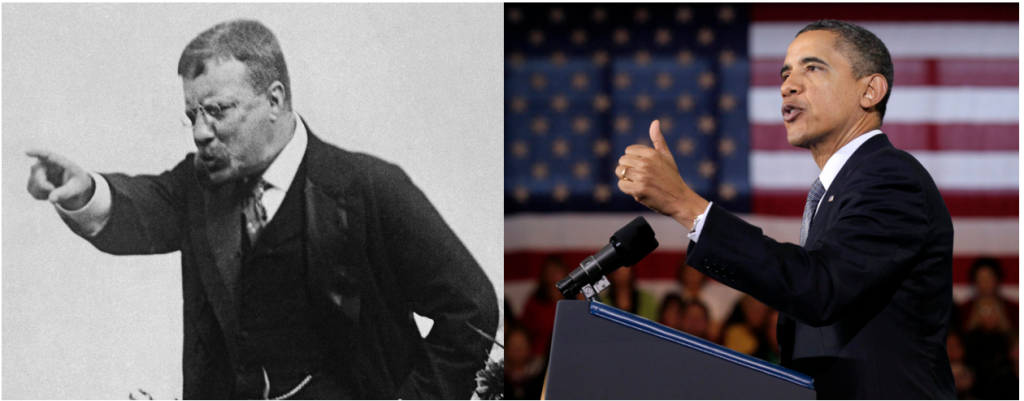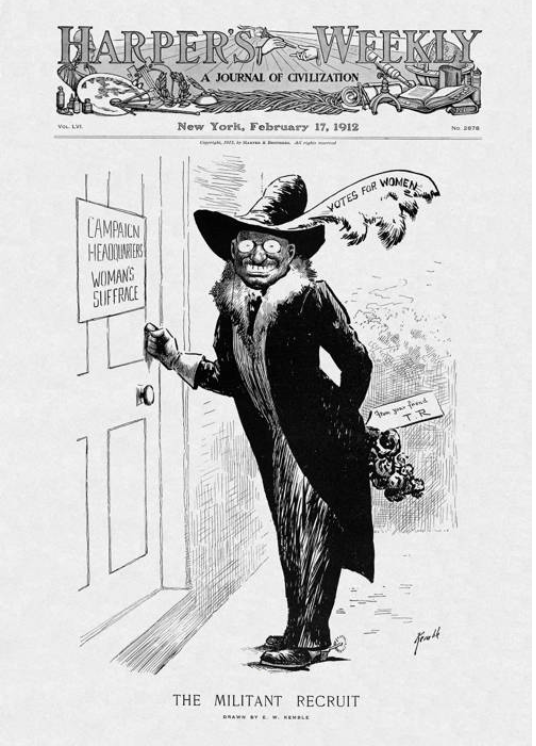Candidates and Parties
Snapshot by Age, Birthplace, and Defining Event
- Eugene V. Debs (1855-1926): Indiana // American Railway Union
- Thomas Woodrow Wilson (1856-1924): Virginia // Princeton University
- William Howard Taft (1857-1930): Ohio // Philippines occupation
- Theodore Roosevelt (1858-1919): New York // Spanish-American War
Progressive Era and Age of Reform
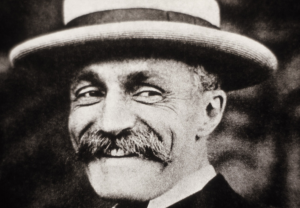
Gifford Pinchot, former head of the US Forest Service, was actually the chief author of the “New Nationalism” speech
Theodore Roosevelt’s “New Nationalism” speech at Osawatomie, Kansas, August 31, 1910 (at dedication of John Brown Memorial Park).
[FULL TEXT HERE WITH EXCERPTS BELOW]:
On history and memory
Now, with this second period of our history the name of John Brown will forever be associated; and Kansas was the theatre upon which the first act of the second of our great national life dramas was played. It was the result of the struggle in Kansas which determined that our country should be in deed as well as in name devoted to both union and freedom; that the great experiment of democratic government on a national scale should succeed and not fail. In name we had the Declaration of Independence in 1776; but we gave the lie by our acts to the words of the Declaration of Independence until 1865; and words count for nothing except in so far as they represent acts. This is true everywhere; but, O my friends, it should be truest of all in political life. A broken promise is bad enough in private life. It is worse in the field of politics. No man is worth his salt in public life who makes on the stump a pledge which he does not keep after election; and, if he makes such a pledge and does not keep it, hunt him out of public life. I care for the great deeds of the past chiefly as spurs to drive us onward in the present. I speak of the men of the past partly that they may be honored by our praise of them, but more that they may serve as examples for the future. It was a heroic struggle; and, as is inevitable with all such struggles, it had also a dark and terrible side. Very much was done of good, and much also of evil; and, as was inevitable in such a period of revolution, often the same man did both good and evil. For our great good fortune as a nation, we, the people of the United States as a whole, can now afford to forget the evil, or, at least, to remember it without bitterness, and to fix our eyes with pride only on the good that was accomplished…
On equality and “square deal”
Practical equality of opportunity for all citizens, when we achieve it, will have two great results. First, every man will have a fair chance to make of himself all that in him lies; to reach the highest point to which his capacities, unassisted by special privilege of his own and unhampered by the special privilege of others, can carry him, and to get for himself and his family substantially what he has earned. Second, equality of opportunity means that the commonwealth will get from every citizen the highest service of which he is capable. No man who carries the burden of the special privileges of another can give to the commonwealth that service to which it is fairly entitled. I stand for the square deal. But when I say that I am for the square deal, I mean not merely that I stand for fair play under the present rules of the game, but that I stand for having those rules changed so as to work for a more substantial equality of opportunity and of reward for equally good service. One word of warning, which, I think, is hardly necessary in Kansas. When I say I want a square deal for the poor man, I do not mean that I want a square deal for the man who remains poor because he has not got the energy to work for himself. If a man who has had a chance will not make good, then he has got to quit. And you men of the Grand Army, you want justice for the brave man who fought, and punishment for the coward who shirked his work. Is that not so?
On “New Nationalism”
I do not ask for the over centralization; but I do ask that we work in a spirit of broad and far-reaching nationalism where we work for what concerns our people as a whole. We are all Americans. Our common interests are as broad as the continent. I speak to you here in Kansas exactly as I would speak in New York or Georgia, for the most vital problems are those which affect us all alike. The National Government belongs to the whole American people, and where the whole American people are interested, that interest can be guarded effectively only by the National Government. The betterment which we seek must be accomplished, I believe, mainly through the National Government. The American people are right in demanding that New Nationalism, without which we cannot hope to deal with new problems. The New Nationalism puts the national need before sectional or personal advantage. It is impatient of the utter confusion that results from local legislatures attempting to treat national issues as local issues. It is still more impatient of the impotence which springs from over division of governmental powers, the impotence which makes it possible for local selfishness or for legal cunning, hired by wealthy special interests, to bring national activities to a deadlock. This New Nationalism regards the executive power as the steward of the public welfare. It demands of the judiciary that it shall be interested primarily in human welfare rather than in property, just as it demands that the representative body shall represent all the people rather than any one class or section of the people.
Obama’s Return to Osawatomie (2011)
President Obama delivered his own economic nationalist speech at Osawatomie, Kansas on December 6, 2011, prior to launching his reelection campaign.
[FULL TEXT HERE with excerpts below]:
On shared roots
Well, it is great to be back in the state of Tex — (laughter) — state of Kansas. I was giving Bill Self a hard time, he was here a while back. As many of you know, I have roots here. (Applause.) I’m sure you’re all familiar with the Obamas of Osawatomie. (Laughter.) Actually, I like to say that I got my name from my father, but I got my accent — and my values — from my mother. (Applause.) She was born in Wichita. (Applause.) Her mother grew up in Augusta. Her father was from El Dorado. So my Kansas roots run deep. My grandparents served during World War II. He was a soldier in Patton’s Army; she was a worker on a bomber assembly line. And together, they shared the optimism of a nation that triumphed over the Great Depression and over fascism. They believed in an America where hard work paid off, and responsibility was rewarded, and anyone could make it if they tried — no matter who you were, no matter where you came from, no matter how you started out. (Applause.)
On economic equality
And ever since, there’s been a raging debate over the best way to restore growth and prosperity, restore balance, restore fairness. Throughout the country, it’s sparked protests and political movements — from the tea party to the people who’ve been occupying the streets of New York and other cities. It’s left Washington in a near-constant state of gridlock. It’s been the topic of heated and sometimes colorful discussion among the men and women running for president. (Laughter.) But, Osawatomie, this is not just another political debate. This is the defining issue of our time. This is a make-or-break moment for the middle class, and for all those who are fighting to get into the middle class. Because what’s at stake is whether this will be a country where working people can earn enough to raise a family, build a modest savings, own a home, secure their retirement.
On nationalism
“We are all Americans,” Teddy Roosevelt told them that day. “Our common interests are as broad as the continent.” In the final years of his life, Roosevelt took that same message all across this country, from tiny Osawatomie to the heart of New York City, believing that no matter where he went, no matter who he was talking to, everybody would benefit from a country in which everyone gets a fair chance. (Applause.) And well into our third century as a nation, we have grown and we’ve changed in many ways since Roosevelt’s time. The world is faster and the playing field is larger and the challenges are more complex. But what hasn’t changed — what can never change — are the values that got us this far. We still have a stake in each other’s success. We still believe that this should be a place where you can make it if you try. And we still believe, in the words of the man who called for a New Nationalism all those years ago, “The fundamental rule of our national life,” he said, “the rule which underlies all others — is that, on the whole, and in the long run, we shall go up or down together.” And I believe America is on the way up. (Applause.)
Birth of the Modern Presidential Primary
Voters
- US Population in 1910: over 92 million
- Voting age population in 1912: over 25 million
- Total votes cast: over 15 million
- Estimated turnout: 59%
- Electoral College: 48 states with 531 electoral votes
- Women could vote in 9 states in 1912: Arizona, California, Colorado, Idaho, Kansas, Oregon, Utah, Washington, Wyoming
